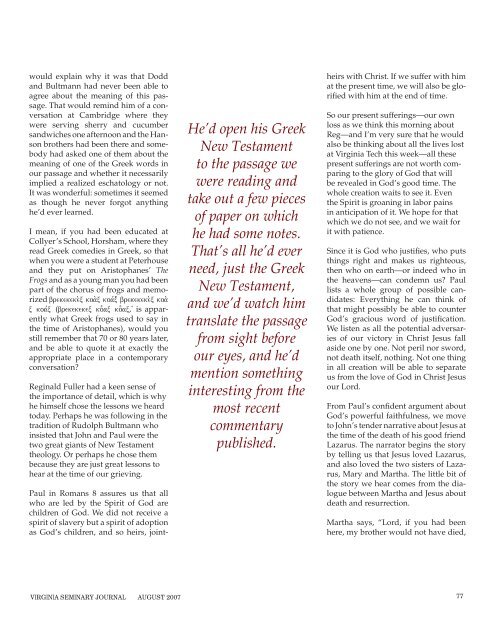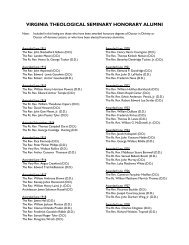Seminary Journal 2008 (August) - Virginia Theological Seminary
Seminary Journal 2008 (August) - Virginia Theological Seminary
Seminary Journal 2008 (August) - Virginia Theological Seminary
You also want an ePaper? Increase the reach of your titles
YUMPU automatically turns print PDFs into web optimized ePapers that Google loves.
would explain why it was that Dodd<br />
and Bultmann had never been able to<br />
agree about the meaning of this passage.<br />
That would remind him of a conversation<br />
at Cambridge where they<br />
were serving sherry and cucumber<br />
sandwiches one afternoon and the Hanson<br />
brothers had been there and somebody<br />
had asked one of them about the<br />
meaning of one of the Greek words in<br />
our passage and whether it necessarily<br />
implied a realized eschatology or not.<br />
It was wonderful: sometimes it seemed<br />
as though he never forgot anything<br />
he’d ever learned.<br />
I mean, if you had been educated at<br />
Collyer’s School, Horsham, where they<br />
read Greek comedies in Greek, so that<br />
when you were a student at Peterhouse<br />
and they put on Aristophanes’ The<br />
Frogs and as a young man you had been<br />
part of the chorus of frogs and memorized<br />
brekekeke.x koa.x koa,x, brekekeke.x koa.<br />
x koa,x (brekekekex ko-ax ko-ax, * is apparently<br />
what Greek frogs used to say in<br />
the time of Aristophanes), would you<br />
still remember that 70 or 80 years later,<br />
and be able to quote it at exactly the<br />
appropriate place in a contemporary<br />
conversation?<br />
Reginald Fuller had a keen sense of<br />
the importance of detail, which is why<br />
he himself chose the lessons we heard<br />
today. Perhaps he was following in the<br />
tradition of Rudolph Bultmann who<br />
insisted that John and Paul were the<br />
two great giants of New Testament<br />
theology. Or perhaps he chose them<br />
because they are just great lessons to<br />
hear at the time of our grieving.<br />
Paul in Romans 8 assures us that all<br />
who are led by the Spirit of God are<br />
children of God. We did not receive a<br />
spirit of slavery but a spirit of adoption<br />
as God’s children, and so heirs, joint-<br />
VIRGINIA SEMINARY JOURNAL AUGUST 2007<br />
He’d open his Greek<br />
New Testament<br />
to the passage we<br />
were reading and<br />
take out a few pieces<br />
of paper on which<br />
he had some notes.<br />
That’s all he’d ever<br />
need, just the Greek<br />
New Testament,<br />
and we’d watch him<br />
translate the passage<br />
from sight before<br />
our eyes, and he’d<br />
mention something<br />
interesting from the<br />
most recent<br />
commentary<br />
published.<br />
heirs with Christ. If we suffer with him<br />
at the present time, we will also be glorifi<br />
ed with him at the end of time.<br />
So our present sufferings—our own<br />
loss as we think this morning about<br />
Reg—and I’m very sure that he would<br />
also be thinking about all the lives lost<br />
at <strong>Virginia</strong> Tech this week—all these<br />
present sufferings are not worth comparing<br />
to the glory of God that will<br />
be revealed in God’s good time. The<br />
whole creation waits to see it. Even<br />
the Spirit is groaning in labor pains<br />
in anticipation of it. We hope for that<br />
which we do not see, and we wait for<br />
it with patience.<br />
Since it is God who justifi es, who puts<br />
things right and makes us righteous,<br />
then who on earth—or indeed who in<br />
the heavens—can condemn us? Paul<br />
lists a whole group of possible candidates:<br />
Everything he can think of<br />
that might possibly be able to counter<br />
God’s gracious word of justifi cation.<br />
We listen as all the potential adversaries<br />
of our victory in Christ Jesus fall<br />
aside one by one. Not peril nor sword,<br />
not death itself, nothing. Not one thing<br />
in all creation will be able to separate<br />
us from the love of God in Christ Jesus<br />
our Lord.<br />
From Paul’s confi dent argument about<br />
God’s powerful faithfulness, we move<br />
to John’s tender narrative about Jesus at<br />
the time of the death of his good friend<br />
Lazarus. The narrator begins the story<br />
by telling us that Jesus loved Lazarus,<br />
and also loved the two sisters of Lazarus,<br />
Mary and Martha. The little bit of<br />
the story we hear comes from the dialogue<br />
between Martha and Jesus about<br />
death and resurrection.<br />
Martha says, “Lord, if you had been<br />
here, my brother would not have died,<br />
77



